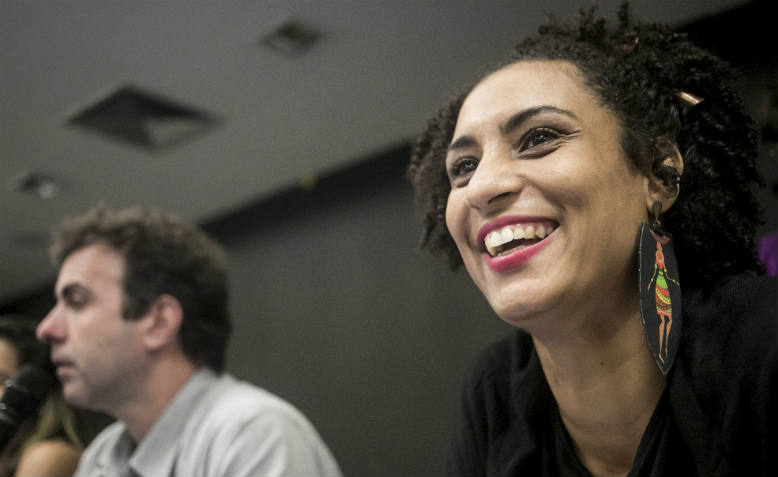 Marielle Franco. Photo: Flickr/Midia Ninja
Marielle Franco. Photo: Flickr/Midia Ninja
The campaigner became a target after standing up for the rights of Rio’s poor communities
The world is shocked by the barbarism of Marielle Franco’s assassination last Wednesday night (14 March). For those who still might not know, Marielle (38) was a councillor for the city hall of Rio de Janeiro and a member of PSOL (Socialism and Freedom Party).
She was in a car on her way home after having taken part in a panel discussion with other black women activists at the community centre Casa das Pretas (House of Black Women) in Lapa in the centre of Rio. The theme of the event was “Black Women Moving Structures”. The driver, Anderson Pedro Gomes (39), was also killed.
Marielle Franco leaves behind a nineteen-year old daughter, Luyara, and her partner Monica Tereza Benicio, “my companion of life and love, the first woman I kissed.”
Marielle was born and raised in the favela of Maré, a shanty town along the bay which tourists drive by on their way from the airport to the south side beaches of Copacabana and Ipanema. She enrolled in the community sixth form (pré-vestibular), went on to graduate in sociology and achieved a Masters degree in public sector management.
Her activism was sparked by the death of a friend who was victim of a stray bullet during a shootout between the police and a drug gang in Maré. She took part in Marcelo Freixo’s 2006 successful campaign for the state congress. In 2016, she was elected with 46,502 votes (the fifth largest vote) as city councillor.
There is no policing as we would recognise it in the favelas of Rio. The police invade favelas as an occupying force. They “enter the favela and leave bodies on the floor” according to their own anthem. The special force known as BOPE has a logo with skull with a dagger that goes through it. They shoot to kill, search school children’s rucksacks and see the entire population of working class neighbours as members of organised crime. With the military intervention, the situation has worsened.
Marielle put her mandate in the service of the residents of favelas. She was their direct channel in the city hall. They would call her directly to denounce police abuses. Furthermore, she had been appointed as the rapporteur of the parliamentary commission that would investigate the actions of the army during the military intervention in the state of Rio de Janeiro. It was her direct connection to the communities that made her a target.
According to Juliano Medeiros, president of PSOL, two important elements also cannot be ignored: racism and sexism. Marielle was, in his words:
a black, lesbian woman from the favela of the Maré who dared occupy a space destined historically to wealthy white men. And this made her, in the sick head of her executioners, a “natural” target, an anomaly of the system. Although a councillor who was elected by an expressive number of votes, her killers…certainly saw her as one of those “disposable” bodies.
As thousands of people take to the streets across Brazil demanding justice and the demilitarisation of the police force, it is becoming clear that the campaign will not end with the imprisonment of Marielle’s assassins. It will only end when we achieve a society like that which Marielle dreamed of; a world where men and women can live with rights and dignity. She ended her participation in the panel debate, hours before being shot, by stressing the importance of unity, “alone we can’t do anything,” and with a quote by Audre Lorde, the American feminist and civil-rights activist, “I’m not free while any woman is unfree, even when her shackles are different from mine.”

